Rmelan (Arabic: رميلان, Kurdish: Rimêlan, Classical Syriac: ܪܡܝܠܐܢ) is a town in the Qamişlo Canton, in the Jazira Region of the Democratic Federation of Northern Syria.
Former headquarter of Syrian Petroleum Company, the town is famous for being one of the major centres of oil production in Syria.
Until 2012, Rumelan was cut off from the Kurds who lived around it by a high wall and barbed wire. Assad’s oil company exploited nearby oil fields of the same name, with profits going to members of his ruling Baath party. Now, the compound serves as the Jazira headquarters of the Movement for a Democratic Society, or TEV-DEM, Rojava’s coalition government in which Yusif’s party, the Democratic Union Party (PYD), has majority control.
The town has a well-developed infrastructure including roads of 22 km-long, public parks, swimming pools, family clubs, cinema halls and cultural centres.
The population of the town is of mixed Arab, Kurd and Assyrian ethnicities. However, Rmelan is also home to a large number of workers resettled from other Syrian regions.
According to an official 2009 estimate, the population at that time was 11,500.
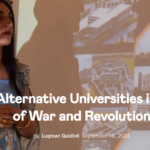
The Democratic Autonomous Administration of North-Eastern Syria (DAANES) is building an alternative education system under siege from multiple powers, defying the control of the Ba’athist education system of the Assad regime as well as the Turkish occupation forces and their proxies. The alternative system has accomplished such measures as the reintroduction of the Kurdish language for young students—drastically altering the way of life in the region. However, building institutions of higher education in an area where many native Kurds could not even have Syrian citizenship two decades ago poses a major challenge.
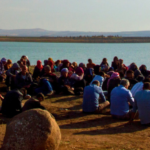
The history of the Kurdistan, the ecological way of life of the people, the effects of the attacks, and the methods of resistance, are intrinsically related. In order to make them more understandable, we focused our report on the area of Koçerata. This region, its people and civil infrastructures in particular, were heavily targeted by Turkish airstrikes in winter 2023-2024.
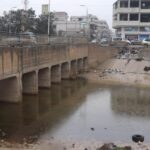
Environmental and agricultural engineers and doctors warned about a potential disaster that could harm the northeastern areas of Syria in the long term following oil leakage into two main river streams, amid efforts to prevent its spread. The Agriculture and Irrigation Board affiliated with the Autonomous Administration of North and East Syria (AANES) announced on
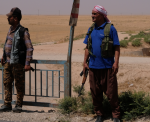
While North and East Syria’s (NES) Women’s and People’s Defense Units (the YPJ and YPG) have taken worldwide headlines for their role in the defeat of ISIS’ caliphate and continue to garner attention, a much lesser-known force in NES is the HPC – Civil Defense Forces. The HPC exist across the region of NES: small, neighborhood groups of volunteers who undertake defense activities on a local level in a decentralized manner. HPC-Jin is the women’s arm of the force. RIC followed the activities of different HPC groups around NES, visited HPC centers, and interviewed several HPC members to shed light on their work, explore how “defense” is defined within the HPC and see the challenges they face.
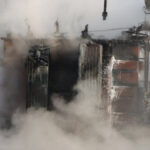
The Executive Council of Cizîr Canton Democratic Autonomous Administration made a press statement in front of Mihemed Şêxo Culture and Art Centre in Qamishlo about the latest wave of Turkish attacks on the region which followed the serious blow suffered by the Turkish army in its war against guerrilla forces in the Kurdistan Region of Iraq.
Turkish attacks on northern Syria have been going on since Friday night, targeting not only residential areas but also service institutions.
The press statement was read by Talet Yûnis, Co-Chair of the Executive Council, and Gulistan Îsmaîl, Co-Chair of the Board of Education and Training.
The statement said that the Turkish army bombed infrastructure, services and strategic places in Dêrik, Tirbespiyê, Rimêlan and Çilaxa districts of Cizir Canton between 12-14 December. As a result of the ongoing attacks, service organisations providing water, electricity and agriculture to the region were left out of service, it noted.
The Executive Council pointed out that these attacks, which violate international law, hinder efforts to fight terrorism, vowing that solidarity and resistance will be strengthened in the face of the attacks, the gains of the revolution will be protected, and the plans for displacement and demographic change in the region will be foiled.
The Cizîr Canton Democratic Autonomous Administration called on the active forces in Syria, the international community, legal and humanitarian organisations to stop the attacks of the occupying Turkish state and to hold it to account for its crimes against humanity.
The Executive Council also called on the people of the region to unite around their institutions and protect the gains of the revolution.

Binefsh Water Filtering and Bottling Plant Co-operative is another step toward enhancing participatory work, achieving self sufficiency, supporting people with limited income, and creating jobs.
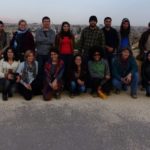
In early December an international delegation visited Rojava’s Cezire [Jazira] canton where they learned about the ongoing revolution, cooperation and tolerance.







